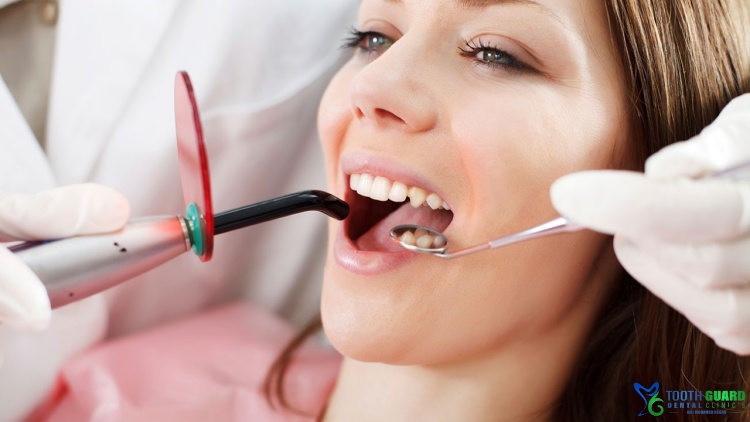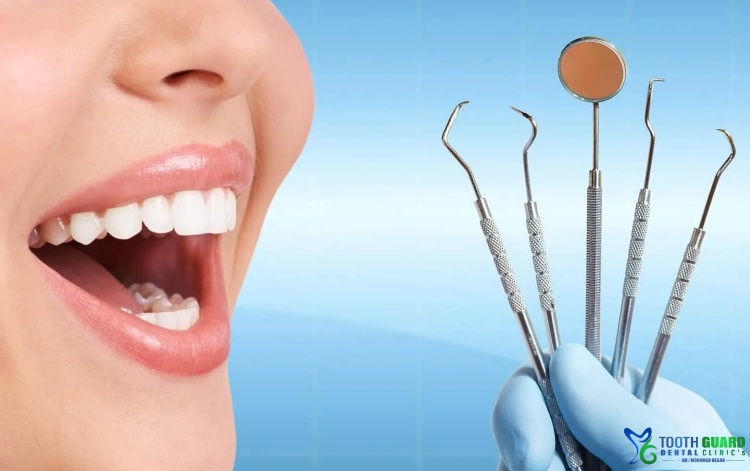
Tooth decay is one of the most common health problems in the world. It is common among children and teenagers, but anyone can get it. If it is not treated, the holes may expand and cause severe pain, infections, and tooth loss, in addition to other complications.
Treatment of tooth decay is largely related to the degree of decay, its seriousness, and the health condition in general. Among the treatments included are: fluoride treatment, composite fillings, root canal treatment, and placing a full tooth cap used to restore and repair damaged teeth.
Dr. Mohamed Hegab is considered one of the best dentists in Egypt. In treating tooth decay, he has the largest Tooth Guard dental clinics, where we provide first-class dental care that works to change one smile at a time. He has an experienced team present to provide for you Exceptional service, whether you are there for a routine checkup or advanced cosmetic dentistry.
Through the following lines, we will learn together about tooth decay, whether there is an effective home treatment, what are the symptoms that appear on your child when his teeth are exposed to tooth decay, and what are the most dangerous types of tooth decay.
All of these and more will be learned by us as you read these lines.
Tooth decay occurs as a result of an interaction between bacteria in the mouth and the sugars or carbohydrates we eat. This reaction leads to the production of acids that erode the enamel, which is the outer layer that protects the teeth. If this erosion continues untreated, it leads to the formation of holes or cavities in the teeth.
Causes of tooth decay:
Eat plenty of sugars and carbohydrates.
Poor dental and oral hygiene.
Accumulation of plaque and bacteria on the teeth.
Dry mouth and decreased saliva production.
Weakness of the enamel layer due to genetic or environmental factors.
Lack of fluoride in the daily system.
Poor eating habits (frequent snacking).
Avoid visiting the dentist regularly.
Having chronic diseases (such as diabetes or esophageal reflux disease).
Drink acidic or sugary drinks frequently.
Maintaining regular oral and dental hygiene contributes to the prevention of tooth decay. By following the following tips, you can prevent tooth decay or rot:
Brushing teeth after eating or drinking.
Mouth rinse.
Visit a dentist regularly.
Checking the possibility of tightening the gaps between the teeth.
Drinking tap water is safe if it is free of germs and microbes.
Refrain as much as possible from eating snacks and sweetened drinks.
Eat foods that strengthen dental health.
Fluoride treatment.
Yes, cavities can spread to other teeth, causing pain outside the areas affected by cavities, as a result of the spread of bacteria that cause cavities from one tooth to another. Caries can be transmitted from one mouth to another by sneezing, eating, drinking after an infected person, or kissing.
Types of tooth decay with pictures
Type 1 dental caries (fissure or pit caries)
Caries in molar fissures is easy to occur and diagnose, and is treated with deep cleaning and preventive fillings.
Class II tooth decay (intercalating caries)
Interstitial caries is difficult to clean and diagnose. It affects the two adjacent teeth and reaches the nerve faster.
Type III caries (front tooth caries)
Frontal caries appears as spots or black holes between the front teeth, which affects the beauty of the smile and is evident while speaking or laughing.
Type IV caries (fracture of front teeth)
This type is not traditional caries, but tooth erosion, and occurs when the front teeth break as a result of a collision or accident, resulting in a gap in the tooth.
Type V caries (cavities between the tooth and the gum)
Caries at the gum line reaches the nerve quickly and is difficult to treat due to the lack of enamel layer.
There are many possible therapeutic methods that help Treatment of gingivitis Here are the most important ways to treat tooth decaytreatment of tooth decay and possible gingivitis:
1. Professional teeth cleaning
Traces of tartar and bacterial deposits are removed using special tools such as a laser or ultrasound device in this type of medical procedure.
2. Dental restoration
Misaligned teeth or dental crowns with the wrong size can be one of the causes of gum inflammation and irritation. This makes removing tartar during your oral care routine difficult, and thus the dental restoration process in such cases is difficult. Treatment of gingivitis Most suitable.
3. Continuous care
The doctor will With your help He will develop an effective program at home for the care of the mouth and gums specifically, and will also schedule regular professional follow-up appointments in order to carry out the necessary examinations and cleanings.
Preventive methods for treating gingivitis
This is done by following all of the following:
Visiting the dentist for examination and following his instructions is necessary to treat cavities in advanced cases.
It is recommended to visit a doctor every 6 months or a year, or as recommended by the doctor based on the condition.
You should adhere to brushing your teeth with fluoride-containing toothpaste and toothpaste to prevent tooth decay.
Using an electric brush helps remove the yellow and limescale layer effectively and at the same pace.
Brushing your teeth for one to three minutes twice a day helps keep your teeth and gums healthy.
Use dental floss daily.
It is necessary to stop smoking, as gingivitis is difficult to treat and the results are not positive for smokers.
Using an antiseptic mouthwash that contains antibacterials helps reduce bacterial growth and maintain oral health.
Treatment of tooth decay in children and adults is often similar, as it depends on removing the tooth decay and filling (filling) its place after cleaning it.
Glass filling material is commonly used to treat children's teeth, especially those that will be replaced later. This type of filling is characterized by its ability to release fluoride, which provides additional protection for the teeth from further cavities.
Caries in children does not cause pain in all cases, so parents should monitor any changes in the child’s behavior or in the appearance of his teeth, such as:
The appearance of white or brown spots on the surface of the teeth.
Crying and irritability.
Intolerance to eating/drinking hot or cold things.
Swollen gums.
Refrain from eating.
Lethargy and dullness.
Caries in the front teeth, known as holes, is the second most common health disorder. Caries occurs in the teeth of children and adults and can affect anyone at any age. Caries is a common cause of tooth loss among young people, and it is one of the most common diseases in children, especially in the front teeth. .
Front tooth decay is treated in several ways. The doctor determines the most appropriate method according to the patient’s condition, and the patient may be able to choose the method he prefers, among these methods:
Crown: If tooth decay causes expansion of the cavity, the doctor drills the affected part of the tooth and covers the tooth with a crown. The crown is made of resin, gold, porcelain, or other medical materials.
Fillings: Fillings are one of the most popular ways to treatment of tooth decay. Fillings are one of the easy ways to treat tooth decay. The doctor digs a small part of the tooth affected by tooth decay. The hole is filled with porcelain or composite resin, or it may be a combination of the two.
Fluoride treatment: Some doctors use fluoride to help restore tooth enamel, which helps strengthen it after it has been eroded by tooth decay.
Root canal: If the decay reaches the inner tooth, the doctor may perform a root canal, where he removes the affected tooth pulp and replaces it with a special filling.
Tooth extraction: If the tooth is left without treatment for tooth decay, and the patient reaches a point where the tooth cannot be restored or preserved, the doctor will extract the tooth, as this is the only solution. This can happen in advanced cases of tooth decay.
There are many laser techniques used in dental treatment and beautification, as the type of laser used varies depending on the procedure and the desired goal, including:
Diode Laser: Bipolar laser is a common type in dentistry, and is characterized by its low energy and its ability to effectively penetrate soft tissue. It is commonly used in gum surgery and teeth whitening.
Eropium indium solid laser: The hard tissue laser is used to remove cavities and prepare teeth for fillings. It is characterized by its precision and effectiveness in removing tissue without causing damage to healthy tissue.
neodymium laser:The neodymium laser penetrates tissue similarly to the solid erubium indium laser and is used in caries removal, gum reshaping, and vascular surgery.
CO2 Laser: The soft tissue laser is one of the types used in gum surgery and dental implants, as it precisely vaporizes diseased tissue. It is also used to remove tumors and relieve pain.
Know more about dental nerve filling
Rinsing with clove oil, sesame oil, nutmeg oil or coconut oil helps cleanse the mouth and gums. It is recommended to rinse the mouth in the morning before brushing the teeth for 5 to 20 minutes to remove toxins and sterilize the mouth, then continue the daily routine using a brush, paste, dental floss and mouthwash.
Tooth decay can also be treated at home by treating caries Teeth With herbs Finally, using the following:
Cloves:Gargling with a solution of water and clove oil or chewing cloves helps sterilize the mouth and reduce tooth decay.
Salt: Treating tooth decay with salt, as salt solution helps sterilize the mouth, reduce bacteria, stop tooth decay, relieve pain, and reduce inflammation.
Garlic:Garlic paste and salt, or chewing garlic directly, contributes to eliminating tooth decay thanks to its antibacterial effect.
licorice:Licorice prevents the growth of bacteria that cause tooth decay and reduces the formation of tartar, by placing its powder on the teeth or using its dry roots to scrub them.
Turmeric:Turmeric eliminates bacteria and reduces inflammation, and it can be used by sprinkling its powder on the teeth or rubbing them With paste Turmeric and mustard oil.
Indian purple:Neem, thanks to its antibacterial effect, is used by rubbing the juice of its leaves on the teeth and gums and then rinsing them, or by using its sticks as a brush, or a paste containing neem oil.
gooseberry Dandelion:Known as prickly currant, it fights bacteria and infections, improves gum health, and reduces tooth decay and bad breath when taken daily.
nutmeg:Nutmeg powder with clove oil helps prevent cavities when placed on the affected teeth for ten minutes, 3 times daily.
Wheat grains:Wheat grains contain the vitamins and minerals necessary for healthy teeth and have an antibacterial effect, and they are used by drinking their juice daily.
AIf you are looking for a reliable dental center to treat dental problems with distinguished services, the Tooth Guard Center led by Dr. Mohamed Hijab is the best choice.
Read about tooth filling cost
اكتشف أحدث النصائح والمعلومات حول صحة الأسنان من خلال مدونتنا






Our team is ready to help with dates, answer your questions and guide you towards achieving your perfect smile